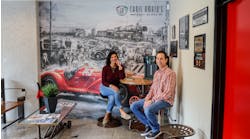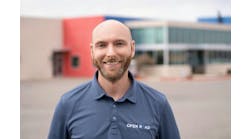Collision shops choose to expand into multi-store operations for a variety of reasons – the need for more space, opportunities in new markets, insurance company encouragement. For Fradella’s Collision Centers, which serves the Lake Pontchartrain area near New Orleans, the leap to a second store was almost forced on them by circumstance.
Fradella’s was founded in 1982 by Michael and David Fradella and Al Waller in Chalmette, La., a small, island-like community near the Mississippi River where the famed Battle of New Orleans took place in 1815. The long-time friends were primarily doing custom work because they loved working on cars. “We did that for a couple of years, then we figured out we have to bring some structure to this and we have to feed our families,” says Waller, who serves as vice president and general manager at Fradella’s.
|
At a Glance: Fradella's Collision Center |
|
Chalmette, Louisiana Headquarters |
|
1 States served |
|
3 No. of locations |
|
37 No. of employees |
|
$6.7 million Revenue |
|
Martin Senour Paints (Sherwin Williams) Paint supplier |
| www.Fradellas.com |
Since then the business has grown to nearly $7 million in revenue, 37 employees and three locations – all in spite of the business nearly being washed away in Hurricane Katrina. The company’s family atmosphere, dedication to quality and teamwork, and embracing new technology and processes have helped Fradella’s weather both natural disasters and the ups and downs of the collision industry, Waller says.
Early technology adapters
The shop began using the 3M ARMS management software fairly early on, which Waller says not only revolutionized his own business, but the collision industry in general. “It really brought it out of the stone ages,” Waller says. “The whole concept was that you needed to job cost, and up until that point there had been very little computerization in our industry. The management system really held you accountable to job cost each job.”
In the mid-1990s, Fradella’s was also an early franchisee for CARSTAR, a relationship that lasted roughly five years until, as Waller puts it, he and his partners decided to move in a different direction as CARSTAR was undergoing some significant management changes. “But they really focused us on standardization of processes and profitability,” Waller says. “We started with them in their infancy. There were a lot of structural changes, and it just wasn’t a good fit for us anymore at that point.”
Opportunity in disaster
By 2000, the single Fradella’s location was doing roughly $2 million in business. While the co-owners were already considering opening a second location, the company’s transition to a multi-store operation was forced by the damage caused by Hurricane Katrina in 2005 and a massive oil spill that occurred just after the storm.
Waller describes Chalmette as “ground zero” for the hurricane, which caused massive amounts of damage, displaced the region’s entire 70,000 population, and left the community without power for ten months. “We were devastated,” Waller says. “And the first thing we did was figure out how to regroup.”
It was far from easy. All of the company’s employees and customers were scattered across the region, and had evacuated as far away as Texas.
That meant locating the entire team, and then finding a location with power and water where they could re-launch the body shop while Chalmette was rebuilt. “The second location kind of picked us,” Waller says. “We found a location in Metairie with utilities that we could use as a base, and we first leased that building in October of 2005.”
Part of the building was converted to a bunkhouse for employees to sleep (a trailer was parked in the lot as well), as everyone had lost their homes to flooding. The Metairie building also had other amenities like a shower and a barbeque pit. A number of employees commuted from out of state during the rebuilding process.
Hurricane Rita, which hit a few weeks after Katrina, caused further evacuations and damage. Despite the destruction, however, Waller says the experience bonded the team and helped fuel the growth that came later.
Waller describes the long process of getting back into the Chalmette location as “painful,” but the shop was up and running again by the spring of 2006. The Fradella’s team split its time between getting the Metairie location up and running and rebuilding in Chalmette. “We started with a body man and a painter there, and started moving part of our crew back from Metairie,” Waller says. “We had to bring cars back and forth because in Chalmette we have 18,000 square feet but in Metairie we just had 4,500 square feet. We’re still load leveling like that today.”
The third location in Slidell was opened in 2009. “That’s an area where a lot of people from Chalmette had relocated after Katrina because it’s on higher ground,” Waller says. “We had a customer base there already.”
The population in Chalmette-proper declined by nearly 50 percent according to census data, but Waller says the community is now growing through the migration of younger families with multiple cars. “That business is steadily growing as the community starts to grow again,” Waller says.
Centralizing operations
With three stores, Fradella’s has now established centralized accounting and HR operations in Chalmette, and recently promoted a store manager to operations manager. “The only way we felt we could grow was to have somebody who worked on strategy, and somebody who worked on operations,” Waller says. “That’s worked out well for us, because it allows me to work on the vision while he is able to manage operational issues with the shop managers.”
The company also plans to centralize its phone system with a central operator who can route calls to the best shop to handle the work.
Fradella’s has also continued to leverage technology to help streamline its operations. Currently, the company uses Rome Technologies body shop management software, along with CCC and Audatex estimating software.
The Rome system helps identify the capacity of each shop for load leveling purposes. “It has an extensive production management system, so we can look at how many hours are in process and how many we have coming,” Waller says. “We can look at that on a minute by minute basis. We promise our customers the safest, fastest, and most flawless repair experience possible, and everything is tied back to that vision and our mission. Every decision about load leveling has to pass that litmus test. We don’t move the car unless we know we can get it done faster and that it benefits everybody.”
In general, Chalmette handles heavy-hit trucks, while Slidell gets most of the heavy-hit cars. Metairie serves as more of an express location, and is expanding to include a co-located quick service operation that will open this October.
Waller says that expansion has made it more challenging to stay on top of day-to-day operations at each location. “As an owner, when you have a single location, you are involved all day long and you can make adjustments as you go along because you are right in the heat of it,” Waller says. “When you start adding locations, you are not in it all the time and it becomes more difficult to have your finger on the pulse of the business.
“You have to build a process and hire people to work in that process and hold them accountable,” he continues. “That’s the challenge: holding yourself and your team accountable for the results. It starts with me. I have to be accountable to myself and everybody else.”
Competition in the New Orleans market is largely made up of long-standing mid-sized shops. “The population here is not transient like you’d find in Atlanta or Dallas,” Waller says. “People are born here, work here, and they are pretty stable. That polarizes the business; your parents got their cars fixed at a particular shop, and that’s where you get your cars fixed. That’s a good and bad thing. It’s hard to get that business away form another shop.”
The company participates in several DRPs and tries to maintain good relations with its customers’ insurers. There are on-site car rental counters at two locations. Fradella’s has also established an active online marketing operation, and works hard to ensure good word of mouth from its customers in order to obtain referrals.
Having a good relationship with Sherwin Williams/Martin-Senour has also been beneficial. “We’re in one of their focus groups, and that’s been a tremendous resource for us,” Waller says. “They do a tremendous job for us as a partner in our business. It takes a big commitment from us, too, but there are a lot of benefits.”
Fradella’s launched a technician training program last year to help with team expansion, as the technician shortage in Louisiana is as pronounced as elsewhere in the country. “We’re competing with a lot of manufacturing here, so we are taking entry-level individuals and having them work in damage analysis for 12 months, then they go on line with a technician,” Waller says. “We give them a path. We’ve got four or five people in that entry level program now.”
In addition to the new construction in Metairie, Fradella’s plans additional expansion. While the first three locations were greenfields, Waller says they have always considered other options such as acquisitions. “We’ve learned that the slowest way to add locations is to build them. It’s a two-year process to execute,” Waller says. “The issue in the New Orleans metropolitan area is that there are few existing businesses that are up for sale. Our economy is relatively stable, most shops have been profitable and there’s not a lot of movement.”
“We’re looking at opportunities with two other locations, so that’s the direction we’re heading,” Waller says. “Adding locations is a benefit to our team. One of our visions for the company is having customers for life so we can provide careers for life. In order to do that, we have to grow our company.”
In fact, that potential for growth is what Waller says is the biggest benefit to an MSO structure. “We can grow our company and work with young folks and our experienced employees alike, and give them a path to advancement,” Waller says. “One of the things that often happens in collision repair is you sometimes run out of a path for people, and they have to move on to make that next step. For me, nothing is more disappointing than to not be able to provide that next step for my teammates. We’re making sure we grow the company so they have a place to grow to.”

